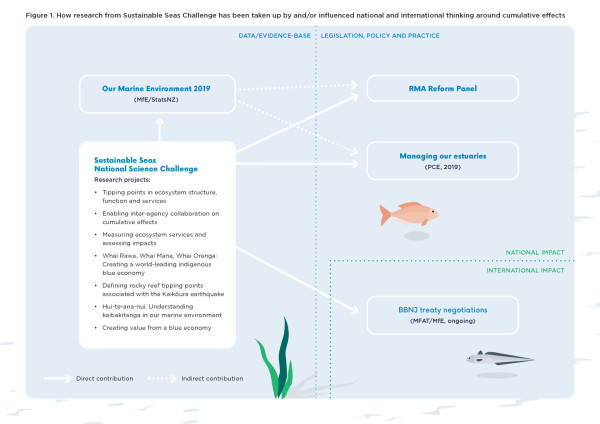- Summary
Prioritising cumulative effects as a critical national issue
This impact case study shows how we have influenced others to take cumulative effects seriously, and recognise it as a critical problem (August 2020)
Sustainable Seas has coordinated and sustained strategic engagement with multiple influencers and agencies. The aim was to feed multidisciplinary information and insights about cumulative effects (CE) from our biophysical, social science and mātauranga Māori research to key people, consultations and reviews.
Findings from several projects – ranging from a framework for collaboration between government agencies to the practicalities of data collection for environmental monitoring – have been taken up by the Ministry for the Environment (MfE), Resource Management Act (RMA) Reform Panel and the Parliamentary Commissioner for the Environment (PCE) as summarised in Figure 1, and described below.
The reach of our research
MfE/Stats NZ, Our Marine Environment 2019 report
This report provides an evidence base for other reports and processes that influence legislation, policy and practice both nationally (RMA reform panel, PCE estuaries report) and internationally (Biodiversity Beyond National Jurisdiction treaty negotiations).
It cites a variety of our biophysical, social science and mātauranga Māori research.
“Awareness of CE as a priority issue has shifted dramatically in the last 5 years and is now recognised across multiple government agencies as the critical issue facing marine managers. Sustainable Seas’ research, clear messaging and strong engagement has made a significant contribution to this shift.
"MfE’s awareness of Sustainable Seas’ research projects, and direct involvement in the ‘Inter-agency collaboration on cumulative effects’ project, meant that we had confidence that we were not overstating the seriousness of the problem.
"The phrasing used in the report – and media briefing – about CE ‘being the most urgent and complex issues facing our marine environments’ is taken directly from the Challenge’s peer-reviewed academic literature." Constance Nutsford, Senior Analyst and Marine Science Lead, MfE
RMA Reform Panel
Sustainable Seas provided expertise in workshop discussions on: identifying, assessing and managing CE; risk and uncertainty; environmental limits/targets; monitoring; and measuring biodiversity loss/gain.
“Sustainable Seas’ Information assisted the Panel understand the particular characteristics of marine environments that mean a different management approach is needed to terrestrial environments, yet both need to be integrated if environmental effects are to be controlled from mountains to sea.
"The Panel gained a better understanding of the challenges around setting limits and targets in the marine environment, and adjusted its approach in the final report accordingly.
"The Panel noted it was difficult to set environmental limits to manage marine biodiversity, and more could be gained by trying to protect the quality of marine habitats. Sustainable Seas’ information has proven useful in ongoing work as MfE looks to assist the post-election Government to respond to the Review Panel’s report.” Richard Hills, Principal Advisor – Natural and Built System, MfE
PCE, Managing our estuaries report
Sustainable Seas researchers engaged with Simon Upton and his team over a sustained period, assisting with the report’s structure and focus as well as contributing expertise regarding monitoring, effects of sea level rise on estuary function, issues with estuary management, Bayesian network tools, CE, and tipping points, which is cited and/or directly reflected in the report’s content. They provided an expert review of the case study for Tauranga Harbour. The report also cites our Hui-te-ana-nui project’s final report about historical kaitiakitanga of the marine environment.
MfE, Biodiversity Beyond National Jurisdiction treaty negotiations
An international UNCLOS Treaty under negotiation, focusing on conservation and sustainable use of marine biodiversity.
“MfE is providing subject matter support for MFAT negotiations for the treaty. We have emphasised the importance of CE when conducting environmental impact assessments and are drawing extensively on research that promotes more informed decision-making around CE – particularly where baseline knowledge is deficient, and uncertainty is high. Sustainable Seas’ research helps to highlight how levels of uncertainty change with the CE of multiple stressors.” Michaela Manley, Analyst, Mauri Moana/Marine policy, MfE.
Contact
Conrad Pilditch, [email protected]
